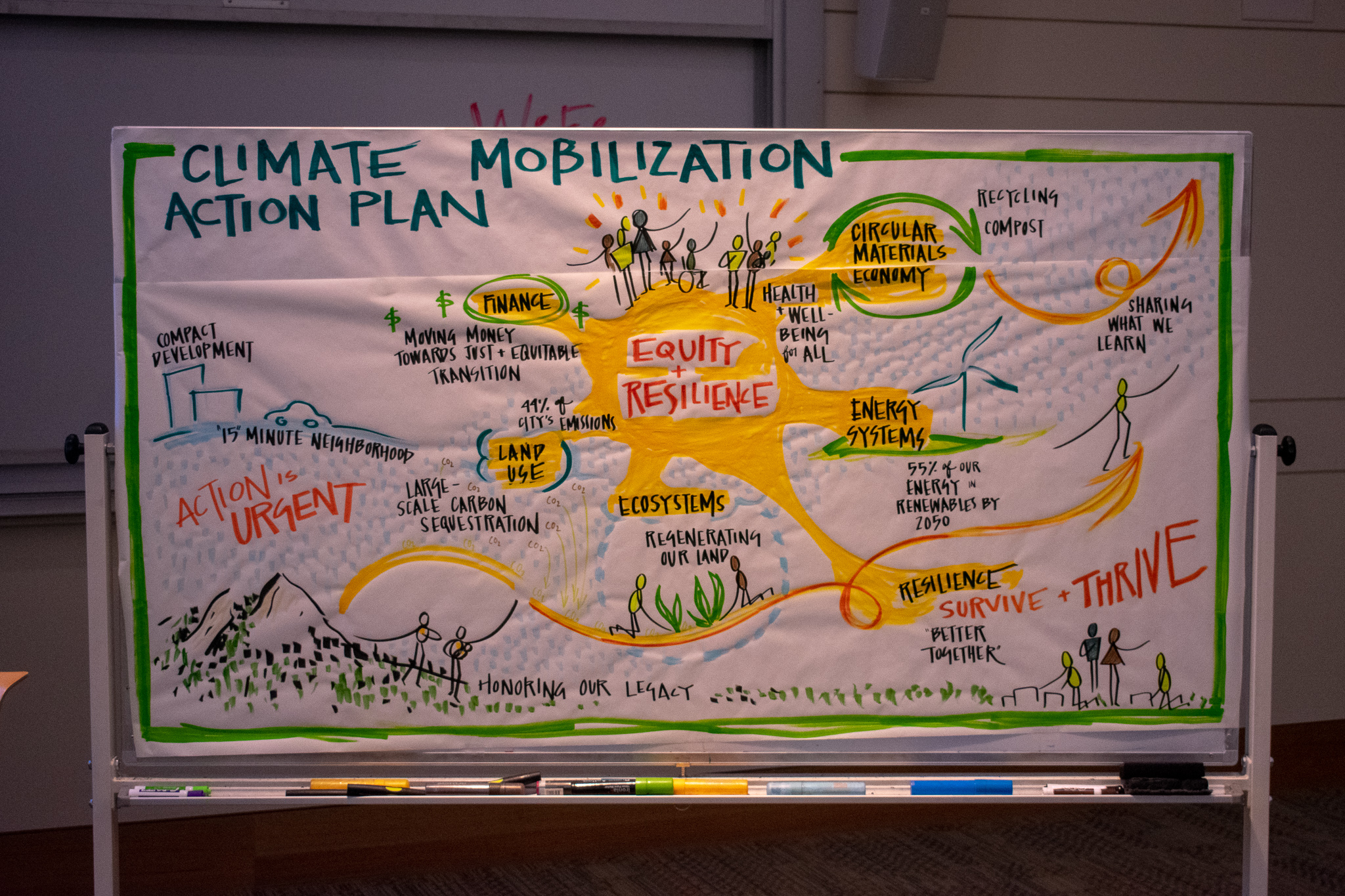
An art piece outside of the CMAP presentation reading “NO TIME,” representing the lack of time available in combating climate change. September 26, 2019. (Anna Haynes/CU Independent)
Correction: This article previously stated that according to 350 Head of Global Finance Campaigns Brett Fleischman, 33 banks in the past three years have contributed over $100 trillion to coal power, fracking and the like. This figure is actually over $1 trillion.
Following the declaration of a climate emergency by the City of Boulder in July, city council held a launch event Thursday for a Climate Mobilization Action Plan (CMAP) aimed at aggressively combating climate change in Boulder. The event included presentations from several big actors in CMAP.
The presentations opened with a performance by Young Women’s Voices 4 Climate, a group for girls aged 13-16 that fuses “theater communication and project-based learning for the sake of climate change.” The group is run by SPEAK, an organization dedicated to making women’s voices heard.

Women’s Voices 4 Climate performing a skit about ecological sustainability. Sept. 26, 2019. (Anna Haynes/CU Independent)
The group used skits, costumes and music to communicate what individuals can do to help the environment. Two examples were reducing food waste and adopting a plant-rich diet. The most important tip for the group was to educate girls; as they marry later, have fewer children and “make sustainable choices for our community.”
Senior Policy Advisor for Climate, Sustainability & Resilience Brett KinCairn said Boulder has a “legacy” of climate action with some of the “most progressive land-use laws in the country.”
“Boulder, like every other place on the planet right now, faces one of the greatest challenges that we’ve ever faced as a species,” KinCairn said.
CMAP focuses on six areas:
- Circular materials economy.
- Energy systems.
- Equity.
- Financial systems.
- Land use.
- Regenerative ecosystems and resilience.
Equity was added to the list of focus areas in 2016, followed by land use and finance per the request of Boulder citizens. Present on the panel of the presentation were:
- Boulder Mayor Suzanne Jones.
- IBM Site Energy Coordinator Brody Wilson.
- Executive Director and Co-Founder of Mad Agriculture Phillip Taylor.
- Eco-Cycle Compost and CHaRM (Center for Hard-to-Recycle Materials) Manager Dan Matsch.
- 350 Head of Global Finance Campaigns Brett Fleischman.
- Director of Planning, Housing and Sustainability Jim Robertson.
- Department of Climate Initiatives Intern Lupe Avalos.
- Boulder County Climate Justice and Climate Resilience Coordinator Garry Sanfaçon.
Mayor Jones represented the circular materials economy focus area. Aside from her municipal duties, Jones serves as the executive director of the environmental organization Eco-Cycle. The goal of Eco-Cycle, Jones said, is to take zero waste and circular economy approaches to environmental sustainability.
According to Jones, 42% of the climate footprint in the United States is from consumption emissions.
Eco-Cycle is approaching sustainability in four ways: reducing the production of single-use plastics, making Boulder and Boulder County a zero-waste model, carbon farming and helping the rest of Colorado and specifically Denver “go from zero waste laggers to leaders.
Representing the financial systems focus area was Brett Frischmann, Head of Global Finance Campaigns for 350, an organization working towards ending the use of fossil fuels.
The two main goals of CMAP relating to financial systems, Fleischman said, are the shift of financial investments away from contributors to climate change and creating mechanisms that will finance a just transition to ecological sustainability.
Fleischman said that in the last three years, 33 banks have contributed over $1 trillion to coal power, fracking and other fossil fuel industries — the top contributor being Chase Bank.
“This is an opportunity for systems change,” Fleischman said. “We’re also going to talk about a Boulder Green New Deal.”

A poster visualizing Boulder’s Climate Mobilization Action Plan. Sept. 26, 2019. (Anna Haynes, CU Independent)
Many facets of the presentation encouraged individuals to also take action. Rella Abernathy, a member of Boulder’s ecological planning team, spoke in support of these individual practices.
“By changing your practices, your neighbors see you do it,” Abernathy explained. “And then they’re more open to the changes they see.”
Outside of the presentation were several booths representing the different focus areas of CMAP. Attendees had the opportunity to speak with government employees about climate initiatives and give feedback by writing on whiteboards next to each table.
CU political science graduate Adam Charny said that Boulder involving the public in CMAP helps them to “understand how much detail it takes to actually make the change.”
Naropa University psychology student Faye Kovler added that the event can inspire other people to say “if they have this all figured out, there’s hope for us to figure it out.’”
Contact CU Independent Senior News Editor Anna Haynes at anna.haynes@colorado.edu.
